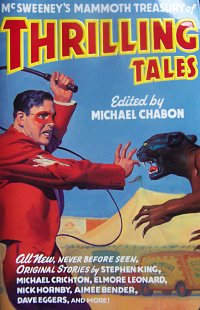
mcsweeney’s quarterly concern #10, michael chabon (ed.)
I’ve given up the monthly book reports in favor of a post every time I finish something. I think it’ll give me a better chance to write more about each book, and my memory will be fresher when I do it. I won’t have a public record of what I’ve acquired each month, but the book queue sidebar gives a good view on what I’ve got (the un-italicized titles) and haven’t yet read.
McSweeney’s Issue 10 (reprinted by Vintage with the proceeds going to support 826 Valencia) is a collection of short stories, but rather than the typical “contemporary, quotidian, plotless, moment-of-truth revelatory stories” (to quote Michael Chabon’s Introduction), the stories are all attempts by the writers to revive the lost art of writing genre short fiction. It’s quite a list of authors too, including Chabon himself, Nick Hornby, Michael Crichton, Dave Eggers, Stephen King, Elmore Leonard, Harlan Ellison, Rick Moody, Neil Gaiman, and others I’m less familiar with.
My favorites include Elmore Leonard’s story about a young man becoming a U.S. Marshall, Kelly Link’s strange story about cat skins and witches, Nick Hornby's take on an end-of-the world coming-of-age story, and Michael Moorcock’s 1930s detective fiction about the murder of Hitler’s half-niece. Rick Moody has an interesting pseudo-time travel story that didn’t grab me enough for me to completely follow it, but it was very interesting and I’ll have to re-read it again to see if I can figure it out.
Some may have suffered in my eyes because I wasn’t enamored of the genre they chose. Despite Geek Love and the first season of Carnivàle, I don’t like carnivals that much, which made Glen David Gold’s carnival story awfully dull. My least favorite parts of Cloud Atlas (itself a work of genre fictions) were the first and last parts, similar to the Jim Shepard story and the “survival / man on the run” story by Carol Emshwiller. Maybe Gold, Shepard and Emshwiller succeeded with fictions I'm just not that fond of.
At the same time, some of the best stories in the collection were the ones that didn’t stray too far into pulpy genres. Dave Eggers’s mountaineering story and Laurie King’s backwoods cabin tale were enjoyable less for the plotting and occasional dips into the genre pool, and more for the fully fleshed out characterization, and the human emotions in evidence.
So, what can the collection tell us about genre fiction and it’s place in the short story world? For me, not a huge fan of short stories to begin with, it’s clear that there’s room for all kinds of fiction, and there’s no reason to reject a story because it’s got themes further from our own, more mundane, experience than usual. I enjoyed both the really pulpy fictions in the collection, and those that were more conventional; and I was bored with quite a few of the stories in each category as well. If Chabon keeps writing great genre novels like The Yiddish Policemen’s Union, maybe there will continue to be room for all sorts of stories in the “Literary Fiction” section at the bookstore.